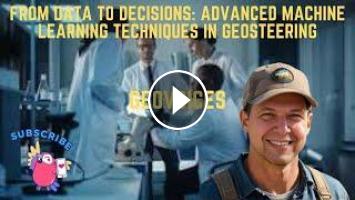The discussion revolves around a groundbreaking paper that introduces a novel approach to predicting complex geology before drilling begins in the oil and gas industry. This innovative method combines Generative Adversarial Networks (GANs) and Forward Deep Neural Networks (FDNNs) to create a powerful decision support system (DSS) for geosteering. GANs generate realistic geological models by learning from high-fidelity simulations, while FDNNs act as fast proxies for computationally expensive electromagnetic simulators. This combination allows for real-time updates and adjustments during drilling operations, significantly improving efficiency and accuracy.
The system employs data assimilation methods, including Markov Chain Monte Carlo (MCMC) and Ensemble Randomized Maximum Likelihood (EnRML), to balance computational speed and accuracy. The approach demonstrates a significant reduction in geological uncertainty ahead of the drill bit, leading to more confident decision-making and improved well placement. The research highlights the potential for this technology to revolutionize geosteering operations, particularly in complex geological environments. However, challenges remain, including the need for high-quality, machine-readable data and addressing label noise in training data. The importance of model interpretability and interdisciplinary collaboration between geoscientists and machine learning experts is also emphasized.
P. Geo. Ricardo A Valls, M. Sc. and Geo Gadfly
Valls Geoconsultant
ORCID ID- https://orcid.org/0000-0002-5421-0914
Scopus Author ID: 7003369619/35335510700
ResearcherID: S-6604-2018
If you like this content, please "buy me a coffee" https://www.buymeacoffee.com/goldendroplets
The system employs data assimilation methods, including Markov Chain Monte Carlo (MCMC) and Ensemble Randomized Maximum Likelihood (EnRML), to balance computational speed and accuracy. The approach demonstrates a significant reduction in geological uncertainty ahead of the drill bit, leading to more confident decision-making and improved well placement. The research highlights the potential for this technology to revolutionize geosteering operations, particularly in complex geological environments. However, challenges remain, including the need for high-quality, machine-readable data and addressing label noise in training data. The importance of model interpretability and interdisciplinary collaboration between geoscientists and machine learning experts is also emphasized.
P. Geo. Ricardo A Valls, M. Sc. and Geo Gadfly
Valls Geoconsultant
ORCID ID- https://orcid.org/0000-0002-5421-0914
Scopus Author ID: 7003369619/35335510700
ResearcherID: S-6604-2018
If you like this content, please "buy me a coffee" https://www.buymeacoffee.com/goldendroplets












Comments